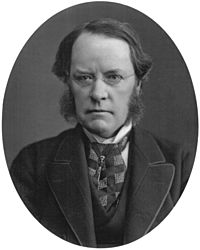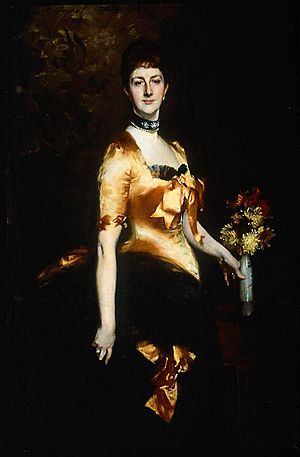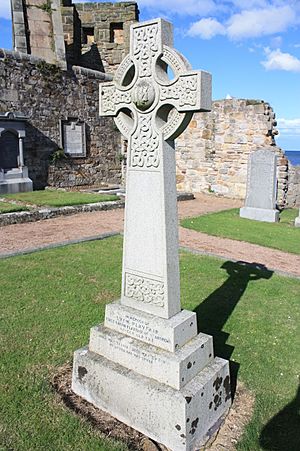Lyon Playfair, 1st Baron Playfair facts for kids
Quick facts for kids
The Lord Playfair
|
|
|---|---|
 |
|
| Postmaster General | |
| In office 18 November 1873 – 17 February 1874 |
|
| Monarch | Queen Victoria |
| Prime Minister | William Ewart Gladstone |
| Preceded by | William Monsell |
| Succeeded by | Lord John Manners |
| Deputy Speaker of the House of Commons Chairman of Ways and Means |
|
| In office 1880–1883 |
|
| Monarch | Queen Victoria |
| Preceded by | Henry Cecil Raikes |
| Succeeded by | Sir Arthur Otway, Bt |
| Vice-President of the Committee on Education | |
| In office 13 February 1886 – 20 July 1886 |
|
| Monarch | Queen Victoria |
| Prime Minister | William Ewart Gladstone |
| Preceded by | Sir Henry Holland, Bt |
| Succeeded by | Sir Henry Holland, Bt |
| Personal details | |
| Born | 1 May 1818 Chunar, Bengal, British India |
| Died | 29 May 1898 (aged 80) South Kensington, London |
| Nationality | British |
| Political party | Liberal |
| Spouses | Margaret Oakes (d. 1855) Jean Millington (d. 1877) Edith Russell (d. 1932) |
| Relations | William Smoult Playfair (brother) Robert Lambert Playfair (brother) |
| Alma mater | University of St Andrews University of Edinburgh |
Lyon Playfair, 1st Baron Playfair (1818–1898) was an important British scientist and politician. He was a member of the Liberal Party. He served as the Postmaster-General from 1873 to 1874.
Contents
Early Life and Education
Lyon Playfair was born on May 1, 1818, in Chunar, Bengal, which was part of British India. His father, George Playfair, was a chief inspector of hospitals. His mother was Janet Ross.
The Playfair family had strong connections to academics. Lyon's grandfather was a professor at the University of St Andrews. Lyon and his siblings were sent to Scotland for their education. Lyon studied at the University of St Andrews, the Andersonian Institute in Glasgow, and the University of Edinburgh.
After his studies, he worked with famous chemists. He was an assistant to Thomas Graham in London. Later, he worked with Justus Liebig in Germany.
A Career in Science
After returning to Britain, Playfair managed a fabric factory. In 1843, he became a Professor of Chemistry. He taught at the Royal Manchester Institution.
Two years later, he joined the British Geological Survey. This group studies the Earth's rocks and land. He also became a professor at the new Royal School of Mines. In 1848, he was chosen to be a member of the Royal Society. This is a very old and respected group of scientists.
The Great Exhibition and Education
In 1851, Playfair was a key person for the Great Exhibition. This was a huge event in London. It showed off new inventions and art from around the world.
After the exhibition, Playfair gave talks about education. He believed Britain needed better technical education. He thought it was important for the country to compete with others. He traveled to many European countries to study their school systems.
His ideas helped create the Science and Art Department. This department worked to improve science and art education in Britain.
Working with Prince Albert
Playfair became a special assistant to Prince Albert. In 1853, he became Secretary of the Department of Science. He continued to work on improving science and technology.
In 1855, he was a commissioner for another big exhibition in Paris. Two years later, he became the President of the Chemical Society. In 1858, he returned to the University of Edinburgh as a Professor of Chemistry. He was also a member of the Royal Society of Edinburgh.
Political Life and Public Service
In 1868, Lyon Playfair became a Member of Parliament (MP). He represented the Universities of Edinburgh and St Andrews. He was part of the Liberal Party.
In 1873, he became the Postmaster General. This meant he was in charge of the postal service. He served under Prime Minister William Ewart Gladstone.
Roles in Parliament
When the Liberals returned to power in 1880, Playfair took on new roles. He became Chairman of Ways and Means. This made him the Deputy Speaker of the House of Commons. He helped run meetings in Parliament. He held these important jobs until 1883.
Playfair was also a strong supporter of public health. In the 1870s and 1880s, there was a debate about vaccination. Some people wanted to stop mandatory childhood vaccination against smallpox. Playfair gave a powerful speech in Parliament in 1883. His speech helped the government keep the law for compulsory vaccination.
Economic Debates
Playfair was also involved in economic discussions. In 1887, some people wanted "Fair Trade." This was a type of protectionism, which means putting taxes on goods from other countries. Playfair strongly supported free trade. He believed in letting goods move freely between countries without taxes.
He gave a speech in Leeds explaining his views. He argued that economic problems were not caused by trade rules. He said that new science and machines were changing how people worked. This speech was very popular and helped explain complex economic ideas.
Later Political Achievements
Playfair continued to serve in government. In 1886, he became the Vice-President of the Committee on Education. He worked on education policies again.
In 1892, he left the House of Commons. He was given the title Baron Playfair. This meant he became a member of the House of Lords. He served as a Lord in Waiting, which is a government role in the House of Lords.
He received more honors for his work. In 1895, he was made a Knight Grand Cross of the Order of the Bath. He also received a special medal for public health in 1897. Playfair is also remembered for helping to promote a new secret code system. It is now known as the Playfair cipher.
Later Life and Legacy
Lord Playfair passed away in May 1898, at the age of 80. He died at his home in London. His body was brought back to Scotland. He was buried in the Eastern Cemetery in St Andrews.
His son, George James Playfair, inherited his title. A fountain was built in St Andrews in 1899 to remember him. The main library at Imperial College in London was also named the Lyon Playfair Library in his honor.
Family Life

Lyon Playfair had two younger brothers. William Smoult Playfair was a famous doctor who helped women during childbirth. Sir Lambert Playfair was a soldier and diplomat.
Lyon Playfair was married three times. His first wife was Margaret Eliza Oakes. After she passed away, he married Jean Ann Millington. They had children together. Jean Ann died in 1877. Later, he married Edith Russell from Boston.
 | Aurelia Browder |
 | Nannie Helen Burroughs |
 | Michelle Alexander |


